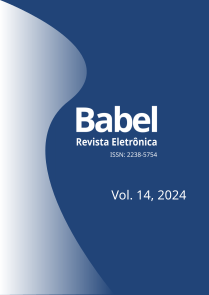The double silencing in The Mute, by Chahdortt Djavann
Keywords:
French language literature, Gender, TranslationAbstract
Chahdortt Djavann is a French-Iranian writer and sociologist committed to feminist causes, mainly regarding the use of the veil by women in the Islamic religion. In her novel The Mute, the author builds a narrative that exposes the double silencing suffered by women in Iran: first due to their gender, then due to the subordinated condition of belonging to a peripheral country in relation to the West. To analyze this theme, we mobilize gender issues with Felski (2003) and Kehl (2016), and also with Spivak (2010) when dealing with subordinate women, as well as seeking to understand the function of the trope of the found manuscript in the narrative as of Angelet (1990). It can be inferred, therefore, that Djavann produces a unique work in order to make us reflect on the different silencing imposed on the women in her fiction and the silencing the West imposes to the non-western countries.
Downloads
References
ANGELET, Christian. Le topique du manuscrit trouvé. Cahiers de l'Association internationale des études francaises, n.42, 1990. p. 165-176. Disponível em: <https://doi.org/10.3406/caief.1990.1736>. Acesso em: 19 jul 2024.
BILONG, Hélène Patience. L’opression de la femme dans La muette de Chahdortt Djavann. Orientador: Philippe Basabose. 109 fl. Dissertação (mestrado) — Departamento de línguas, leteraturas e culturas modernas da Universidade Memorial de Terra Nova, Terra Nova, Canadá, 2022. Disponível em: <https://doi.org/10.48336/S8ZC-8Y43>. Acesso em: 19 jul 2024.
CHATZIDIMITROU, Ionna. Speaking Silence: Translation in Chahdortt Djavann’s La Muette. MLN, vol. 127, n.5, Johns Hopkins University Press, 2012. p. 1206-1225.
DJAVANN, Chahdortt. Bas les voiles ! Paris: Gallimard, 2003.
DJAVANN, Chahdortt. De l’apprentissage du français à l’écriture. In: LE BRIS, Michel; ROUAUD, Jean (org.). Pour une littérature-monde. Paris: Gallimard, 2007. p. 287-303.
DJAVANN, Chahdortt. A muda. Trad. Liliane Mendonça. Curitiba: Arte & Letra, 2021.
FELSKI, Rita. Literature after feminism. Chicago: The University of Chicago Press, 2003.
KEHL, Maria Rita. Deslocamentos do feminino: a mulher freudiana na passagem para a modernidade. 2 ed. São Paulo: Boitempo, 2016.
LEJEUNE, Philippe. Le pacte autobiographique. Paris: Seuil, 1975.
MAINGUENEAU, Dominique. Cenas da enunciação. Organização Sírio Possenti, Maria Cecília Pérez de Souza-e-Silva. São Paulo: Parábola Editorial, 2008.
MEIZOZ, Jérôme. Postures littéraires: mises en scène modernes de l’auteur. Genève: Slatikne Érudition, 2007.
MEIZOZ, Jérôme. Ce que l’on fait dire au silence: posture, ethos, image d’auteur. Argumentation et Analyse du Discours, n. 3, 2009. Disponível em: <http://journals.openedition.org/aad/667>. Acesso em: 19 jul 2024.
SPIVAK, Gayatri Chakravorty. Pode o subalterno falar? Trad. Sandra Regina Goulart Almeida, Marcos Pereira Feitosa, André Pereira Feitosa. Beloza Horizonte: Editora UFMG, 2010.
Published
How to Cite
Issue
Section
License
Copyright (c) 2024 Babel: Revista Eletrônica de Línguas e Literaturas Estrangeiras

This work is licensed under a Creative Commons Attribution-ShareAlike 4.0 International License.
Os autores detém os direitos autorais sem restrições, porém ao submeter os originais, concordam em transferir a este periódico os direitos da primeira publicação. Isto deve ser informado em caso de nova edição do texto. As produções que derivarem deste material, devem obrigatoriamente citar a fonte. Os textos publicados nesta revista, salvo indicações contrárias, encontram-se sob uma licença Creative Commons Atribuição 4.0 Internacional.

